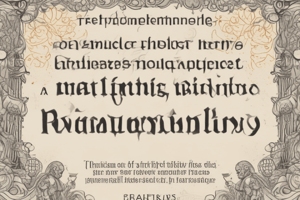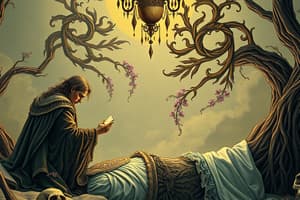Podcast
Questions and Answers
What does the imagery of 'Fate' suggest about human power and achievements?
What does the imagery of 'Fate' suggest about human power and achievements?
- Fate is something that can be negotiated with.
- Human power ultimately overcomes Fate.
- All achievements are meaningless in the face of Fate. (correct)
- Fate only affects those in power.
What is the significance of the comparison between swords and spades?
What is the significance of the comparison between swords and spades?
- Spades are tools for harvest, while swords are for celebration.
- Swords are linked to eternity, while spades lead to death.
- Swords represent power, while spades signify labor and humility. (correct)
- Both symbolize the futility of conflict in the end. (correct)
What does the phrase 'Only the actions of the just Smell sweet and blossom in their dust' imply?
What does the phrase 'Only the actions of the just Smell sweet and blossom in their dust' imply?
- Only the accolades of the powerful last beyond death.
- Justice and righteousness are remembered positively after death. (correct)
- All deeds are equally recognized in death.
- Nature flourishes more in the presence of death.
What does 'Death lays his icy hand on kings' signify about royalty?
What does 'Death lays his icy hand on kings' signify about royalty?
What is represented by the imagery of the 'purple altar'?
What is represented by the imagery of the 'purple altar'?
Flashcards are hidden until you start studying
Study Notes
Themes of Mortality and Fate
- The transient nature of power is highlighted; even kings are not immune to mortality.
- Imagery of death suggests inevitability, represented by "Death's icy hand" affecting all, regardless of status.
- Fate is described as an unavoidable force; no amount of wealth or power can protect against it.
Symbolism
- The "sceptre and crown" symbolize royalty and authority, emphasizing that these honors ultimately crumble.
- Contrast between the noble symbols of power and humble tools of labor, like the "crooked scythe and spade," illustrates equality in death.
Human Conflict and Vanity
- References to men with swords depict the violence and glory related to conquest, yet remind that such victories do not escape death.
- The notion that individuals "tame but one another" reflects on how power struggles lead to mutual destruction.
The Inevitability of Death
- Death is characterized as a final destination, with all men eventually succumbing, emphasizing 'stooping to fate.'
- "Pale captives" suggests the helplessness that accompanies the end of life.
Legacy and Actions of the Just
- The beauty of a life well-lived is contrasted with the withering of garlands, indicating that true honor is found in just actions.
- The phrase "only the actions of the just smell sweet and blossom in their dust" emphasizes that virtue is remembered beyond life, while lesser deeds fade.
Overall Message
- The text conveys a powerful reflection on the futility of pride and the certainty of death, urging an acknowledgment of mortality and the importance of just actions.
Studying That Suits You
Use AI to generate personalized quizzes and flashcards to suit your learning preferences.




